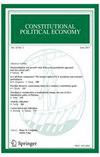专制的家庭政策
IF 0.7
Q2 LAW
引用次数: 2
摘要
家庭造就人。这给专制政权带来了一个问题。一方面,家庭生产通过提高劳动力的未来生产率而使独裁者受益。另一方面,家族生产从集体中抽走当前的资源和忠诚,从而威胁到独裁者。本文提出了一个专制家庭政策理论,其中决定因素是独裁者愿意放弃多少对资源的当前控制以换取未来的控制。我将这一理论应用于苏联,认为苏联家庭政策的大转变(1917-1944)是在不同条件下对这种权衡的回应。本文章由计算机程序翻译,如有差异,请以英文原文为准。
Autocratic family policy
Families produce people. This presents a problem for autocratic regimes. On the one hand, familial production benefits the autocrat by augmenting the future productivity of the labor force. On the other hand, familial production threatens the autocrat by drawing current resources and loyalty away from the collective. This paper presents a theory of autocratic family policy in which the deciding factor is how much present control over resources an autocrat is willing to forego for future control. I apply this theory to the Soviet Union, arguing that the somersault of Soviet family policies (1917–1944) was a response to this tradeoff under different conditions.
求助全文
通过发布文献求助,成功后即可免费获取论文全文。
去求助
来源期刊
CiteScore
1.80
自引率
0.00%
发文量
18
期刊介绍:
Constitutional Political Economy is a forum for research in the broad area of constitutional analysis, which lies at the intersection of several approaches in modern economics, sharing a common interest in the systematic integration of the institutional dimension - the study of political, legal and moral institutions - into economic analysis.
While its primary discipline is economics, Constitutional Political Economy is explicitly interdisciplinary, aiming to encourage an exchange between the various social sciences, including law, philosophy, political science and sociology. Theoretical and empirical research, as well as contributions to constitutional policy issues, are considered for publication.
Officially cited as: Const Polit Econ

 求助内容:
求助内容: 应助结果提醒方式:
应助结果提醒方式:


